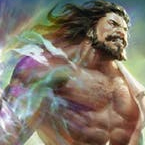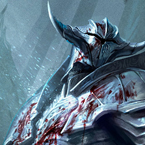Welcome back to the third installment of my Oldhim Pro Series. You can read the introduction here, the first installment here, and the second- with matchup guide- here.
With October behind us, I’ve had a lot of time to reflect and re-examine my way of building Oldhim. In Kitchen Table TCG's monthly October CC league, I’ve managed to go 3-1, narrowly losing out to Bravo's Command and Conquer into a double Pummel (Red) in the final round of swiss. Regardless, the 3-1 record bought my entry into the top seat of single elimination, playing for the league win. Unfortunately, I paired against a Prism control player in round one of the cut, and lost out on continuing through the bracket in a very close game.


It’s unfortunate that, in the CC format, Oldhim’s greatest enemy (outside of, perhaps, Prism) seems to be the round timer. I've had to perfect closing out games in a timely manner- Oldhim has to play efficiently with time in almost every matchup. While I have adopted strategies, lines of play, and improvements to my own time efficiency while playing, the clock remains a constant, omnipresent threat within my games.
Oldhim's Place in the Meta
In both Blitz and Classic Constructed, I've now put in the reps to validate my initial perception of Oldhim's potential, and in some of the interactions he can generate. But with Oldhim’s complexity- and the aforementioned rivalry with Father Time- it’s not surprising to see that Oldhim has yet to perform exceptionally well in a major Constructed event. Still, I can’t help but feel Oldhim is far from solved.
Another factor in Oldhim's limited representation? His 'Talent'less fellow Guardian Bravo has been CRUSHing it in the CC format. Early data ahead of US Nationals shows us that Bravo is one of the decks to beat in the event, and I wouldn’t be surprised to see him top the US Nationals when the dust settles.
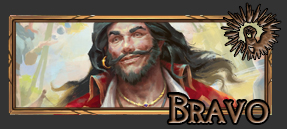
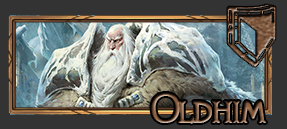
(While I still remain focused on Oldhim, I will be publishing an article with the Rathe Times on the changes I have made to Bravo coming out of Tales of Aria’s release. Unsurprisingly, I take a more conservative, control approach to building Bravo for the new meta, as opposed to many of the aggressive and midrange variants going around at the moment.)
I can’t help but feel Oldhim is far from solved, and may also get a much-needed boost to his timeliness with the next supplemental set that will release early next year. Until then, Oldhim will continue to struggle to outshine Bravo's limelight-stealing performance. And if Prism is able to adapt in a way to retain its advantage over Guardian and do something about Briar, the CC meta will take a very unfavorable shape. As much as I have tried to adjust my deck and sideboard in a way that makes the Prism matchup ‘playable’, it's still very much an uphill battle against both the player themselves, and the clock.
Realistically, Oldhim may find more of a welcoming home in the Blitz format’s meta for now. I was able to 4-0 and win Kitchen Table TCG’s recent blitz event with my variant of Ice Control Oldhim. While the clock is still a concern, Oldhim feels very powerful in Blitz if you are able to pitch correctly for the late game, set up your combos, and fuse attacks like Oaken Old.

There are other ways the meta could still develop. Briar is emerging as a hyper-aggressive and powerful new contender in the CC format. It's not hard to imagine a rock/paper/scissors format developing that Oldhim would fit nicely into. Oldhim beats Briar handedly, Briar beats Prism handedly, and Prism (as we know) beats Oldhim handedly. If Briar's presence increases, we may see Prism's presence diminish, giving Oldhim the opportunity to shine. It will be interesting to see Briar’s emergence in the format and what that does to the representation of Prism. This dynamic will help determine the viability and success of Oldhim as the meta continues to develop.

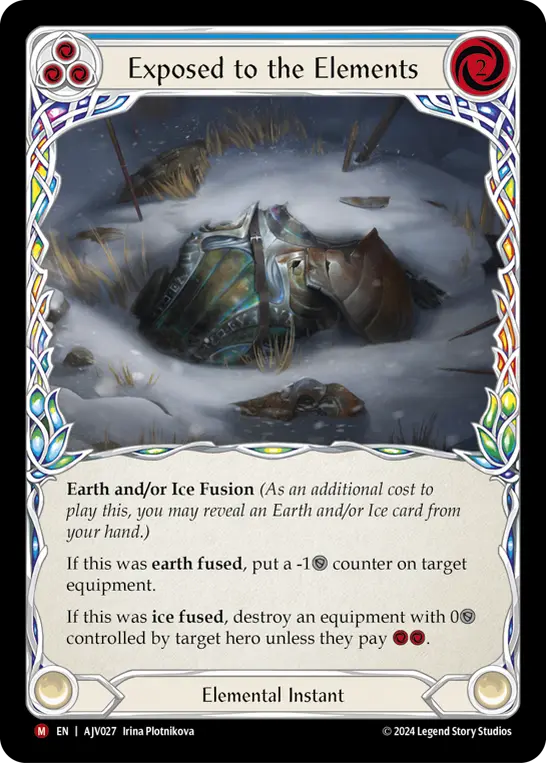
In a Prism-light meta, there is much more room in Oldhim’s sideboard for cool tech choices and powerful cards, like Exposed to the Elements and the full set of Blizzard. It also means that there is potentially room to cut the Rouse the Ancients package in the main deck for more disruption and control elements. I’ll be watching Prism’s meta share closely and further working to optimize Oldhim’s sideboard once we get data from US Nationals.
Refinement
With the meta starting to establish itself, I’ve found myself rapidly prototyping new things in the deck. I’ve played over 50 games with Oldhim since the last article in the Pro series, and somehow I'm still learning new things about the deck in almost every game I play. There is surprising depth to playing Oldhim, and studying him has certainly made me a better player, especially in improving my understanding of the Flesh and Blood action economy. Strangely enough, while their strategies are quite different, I feel I’ve also improved on Bravo, despite not touching the deck since early in spoiler season! It has been very interesting to be on the other side of the table from Bravo- outside of mirror matches, of course.
My lessons learned and the changes made to the decklists both revolve around the expertise I have gained through focused repetition, and the data we have coming out of some major CC events. The Prism matchup has certainly improved from the earliest versions of this deck, but I feel Oldhim’s sideboard will continue to evolve substantially over time as the meta develops.
Here are my updated decklists from the previous edition of the series:
You'll notice that those are the same links from the last article. I will be maintaining both of these decklists even after the fourth and final edition of this Pro series has been published. If you’d like to always have the most up-to-date versions of my decks, be sure to bookmark these links.
Time as the Enemy
Good time management is essential for Oldhim. You need to develop muscle memory and learn the bread and butter interactions of the deck, even coming from a Guardian background- it’s more complicated than just blocking with two cards from hand and swinging Anothos for six!


Most of your time as Oldhim will be spent mapping out how to most efficiently defend against opponents’ attacks to launch a reasonable retort back across the table on your next turn. Learn how your cards work, and how to use Crown of Seeds and Rampart of the Ram’s Head; they are essential to the menial but ever-looming task of racing against the clock.
Forged for War?
Forged for War was perhaps one of the most controversial picks. Zero-defense equipment inherently lacks destruction triggers like temper, blade break, or battleworn; they acted as ideal, reusable blocks whenever Forged for War came into play, and served a crucial role against go-wide aggro decks. While it was a powerful card when used to keep the life total high and draw into a power attack, the value was somewhat diminished with each turn that passes.

As a sideboard option, it is extremely powerful in some matches like Dash- but as you likely know, sideboard slots are tight in this list. For now, I am testing Fate Foreseen in its place, but wouldn’t be surprised to see this return in the future if the meta shifts toward more aggressive decks that are more prone to breaking the combat chain. Unfortunately, Briar is not prone to breaking the combat chain between attacks thanks to the likes of Vela Flash and other powerup cards that are played before the first go-again attack. This diminishes the value from Forged for War (and Rampart of the Ram’s Head) in this crucial match.
Winter's Bite?
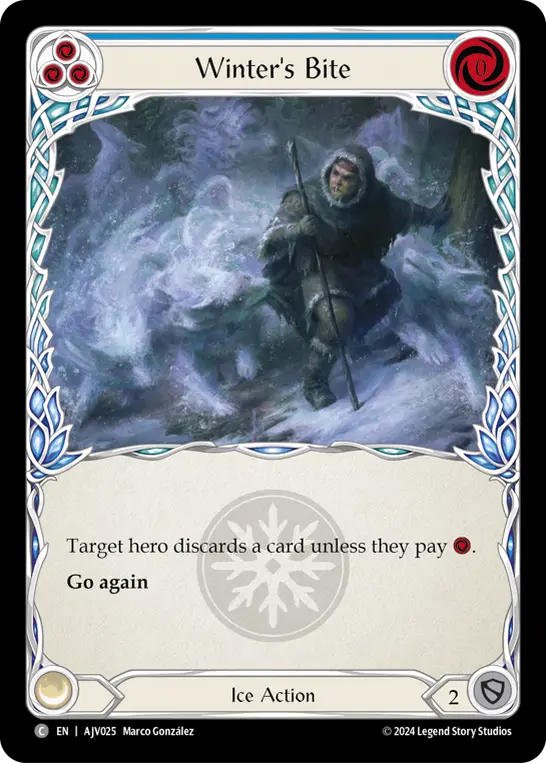
In part two of the series, I wrote that Winter’s Bite was not a good card in Oldhim’s kit. I was wrong, and have since learned the value in including this card in the list in both the blue and yellow slots. As an offensive tool, this card denies four-card hands, and makes opponents think twice when it comes to deciding how to block your next follow-up attack. Chaining two of these back-to-back into an attack- even something simple like the hammer swing- is especially powerful. I’ve been thoroughly impressed with this card’s performance in a variety of matchups.
Heart of Ice?


Heart of Ice is as impactful against Katsu and Prism (and the occasional Kano) as I had expected. Though I have thoroughly tested it against Bravo as well, I’ve found the utility and armor density from Tectonic Plating is more beneficial than taxing the defense reactions in the deck. Having the ability to block out hammer efficiently while also playing cards like Endless Winter for only a single blue pitch versus two is crucial to the match against Bravo. I needed to test this out to confirm, and in eight games against Bravo with Heart of Ice equipped, I’m confident that Tectonic Plating is the correct choice in the match.
Pitching is Everything
It is essential to pitch for the late game and to close games out in a timely manner. I can’t stress this one enough. In almost every case, you want to pitch for fused Oaken Old and Tear Asunder in the late game. Pitching a Command and Conquer and Endless Winter together can also be especially powerful, since you can setup a Seismic Surge token to reduce the cost of Endless Winter to a single blue pitch.

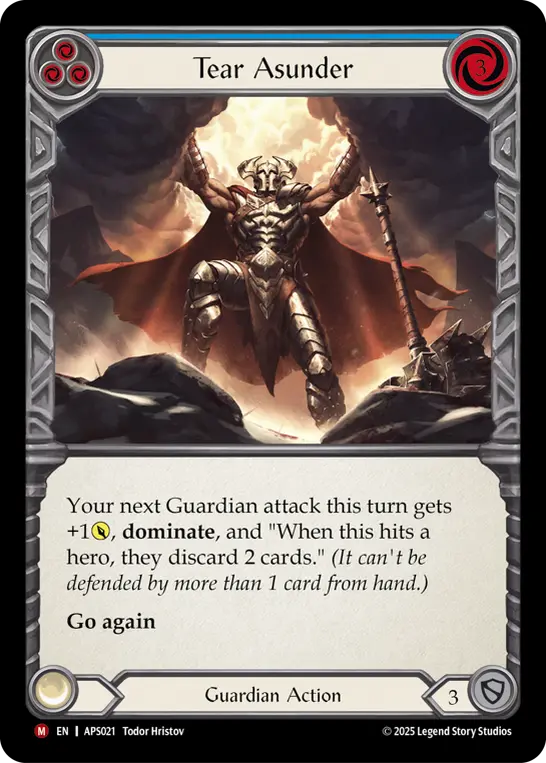
Having these cards in place for the late game is absolutely essential to closing out games, as dominate will usually be how Oldhim wins the game at low life totals- we don’t run Pummel. Extra hand disruption with Winter’s Bite and Polar Blast can also help close out games when you lack a source of dominate.
Oldhim rewards players who pitch with intent and try to set up for the late game. It takes practice and mastery to learn how to do this right- and also to know when it is and isn’t worth playing Awakening to disrupt the order of your pitch to pay for a swing in tempo.

The ultimate goal of Oldhim in the late game is to chain two or more fused Oaken Old back to back, or play Oaken Old that hits into a Tear Asunder that will hit the very next turn. Life is especially important as a resource to Oldhim, and one you want to preserve throughout the game. Oldhim will need to take at least one big hit throughout the game to play out a powerful combo and swing the tempo of the match back into his favor.
Big Blues

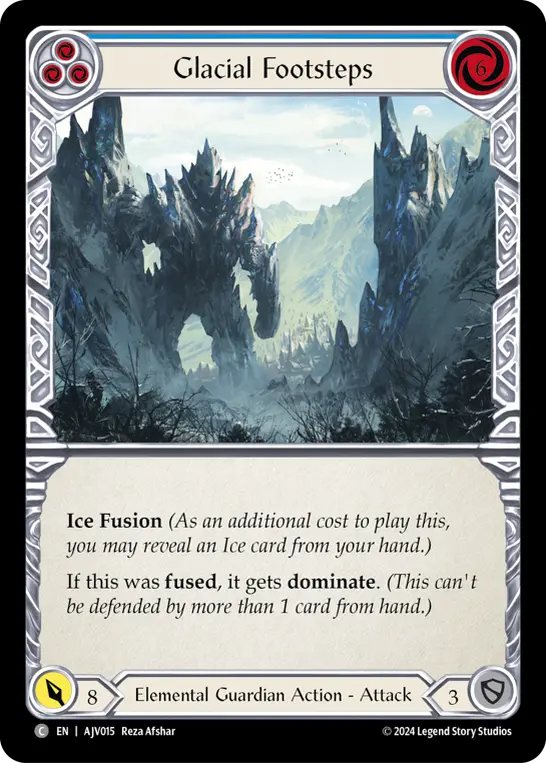
Don’t neglect the power of the big blues in the deck, like Cranial Crush and Glacial Footsteps (Blue). These can be very valid on their own when you just need raw numbers. Glacial Footsteps has dominate when it’s fused, so don’t be afraid to try to set this up in arsenal and play it out to close the game. I’ve won quite a few games by doing this and keeping my life total high enough to take a hit when my opponent and I are trading blows and keeping roughly two card hands every turn.
Fatigue Isn't Viable in Most Cases!
Outside of Blitz, I close most games as Oldhim with dominate. Fatigue for Oldhim usually means weathering out your opponent’s big threat cards until they don’t have enough meat left in the deck to kill you, rather than decking them completely. Because fatigue isn’t as viable as I initially expected, Oldhim does care less about card count in the deck. By naturally leaning into the defensive route of sinking resources into Crown of Seeds and Rampart of the Ram’s Head throughout the match, you will keep your card count high, and fuse target density even higher.
Bonus Observation: Oldhim > Command & Conquer!
Oldhim can't really be C&C'd!
This advantage comes in the form of being able to ship off our arsenal slot with Crown of Seeds at instant speed, drawing a new card and preventing one damage. This is invaluable when your opponent tries to play Command and Conquer against you, as it won’t have the same taxing effect it usually does. It feels great to have such an easy and consistent out for this card without spending a ton of cards from hand to block out the attack or worrying about discarding the card in arsenal. While the arsenal card still goes to the bottom of the deck, it will eventually be drawn again if the game goes long enough or you shuffle your deck with Awakening.
In Conclusion
Overall, I have really enjoyed my time with Oldhim and trying to solve this complex hero in the Classic Constructed format. Oldhim has many viable lines of play, and can take a reactive and ever-evolving approach to playing out each and every turn. Slow and steady, Oldhim CAN close out games and win in time when you pilot him efficiently.
Though I expect my list to continue to change going into the fourth and final article of this series, my journey with Oldhim is far from over- especially for this upcoming Blitz skirmish season. I’ll be watching the meta and looking to optimize for the Prism matchup. I expect Prism as we know it will likely shift in response to the growing Briar threat- and that could be good news for us as Guardian players.
It’s a very interesting time to be an Oldhim player, and I can’t help but feel hopeful that all the time I have spent practicing the new Guardian will pay off when the dust of the emerging meta settles.
What questions about Oldhim do you have? How have you been enjoying the deck? Join the conversation and let me know in the comments below!



